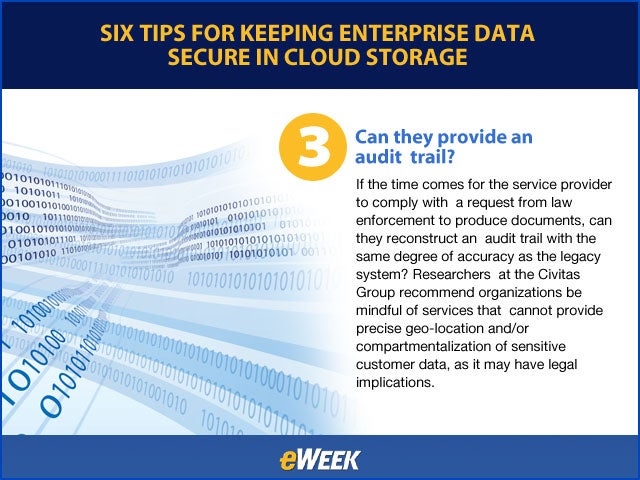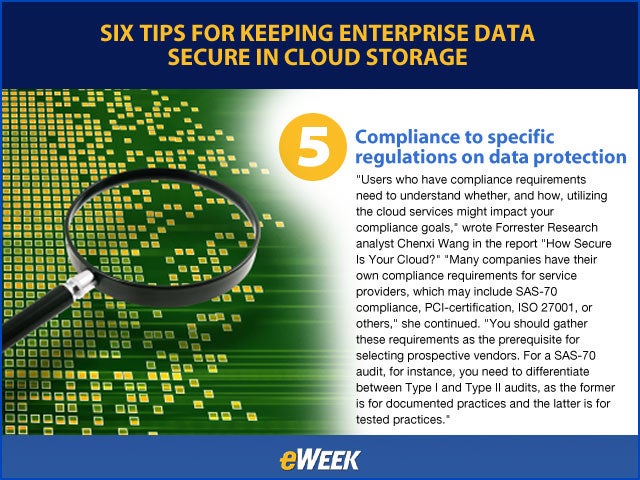eWEEK content and product recommendations are editorially independent. We may make money when you click on links to our partners. Learn More.
1Six Tips for Keeping Enterprise Data Secure in Cloud Storage
By Brian Prince
Storing data in the cloud has brought with it its own set of compliance and security concerns — something underscored recently by a survey by Unisys. The survey revealed that 51 percent of the 312 respondents cited security and data privacy as their top concern regarding cloud data storage. While experts say the public cloud may be ready for certain applications, organizations need to be sure those apps are secure — and that they can prove it when questioned by auditors. With that in mind, eWEEK spoke to analysts and others in the field and asked them what companies should think about from a security and privacy perspective before pushing their data into the cloud. Here are few of the questions and considerations you should take to your service provider.
2Know how physical, logical controls are managed
Organizations should look to get a handle on just how well the provider can manage data. Part of that means finding out the hiring, training and auditing practices for all staff responsible for securing your data, advised Ken Satkunam, president of NorthStar Technology Group and CTO of Sentry Blue. “Learn everything you can about the data center where the data is stored that could cause service interruption, including physical and environmental controls.”
3Data privacy should be part of the equation
4Can they provide an audit trail?
If the time comes for the service provider to comply with a request from law enforcement to produce documents, can they reconstruct an audit trail with the same degree of accuracy as the legacy system? Researchers at the Civitas Group recommend organizations be mindful of services that cannot provide precise geo-location and/or compartmentalization of sensitive customer data, as it may have legal implications.
5Application security should be on the brain
“Does the service provider employ a software assurance program to properly assess the impact of upgrades, enhancements or new features within the applications that make up their service offering?” asked the Civitas Group in a recent report. The research and advisory firm suggested that potential adopters look for cloud providers who are able to demonstrate a commitment to adapting software security assurance programs to the needs of application development in the cloud.
6Compliance to specific regulations on data protection
“Users who have compliance requirements need to understand whether, and how, utilizing the cloud services might impact your compliance goals,” wrote Forrester Research analyst Chenxi Wang in the report “How Secure Is Your Cloud?” “Many companies have their own compliance requirements for service providers, which may include SAS-70 compliance, PCI-certification, ISO 27001, or others,” she continued. “You should gather these requirements as the prerequisite for selecting prospective vendors. For a SAS-70 audit, for instance, you need to differentiate between Type I and Type II audits, as the former is for documented practices and the latter is for tested practices.”
7Customers should understand incident response and remediation
‘In the event that a security or privacy incident occurs, learn how the provider handles detection, notification and eventual correction of the issue,’ Satkunam said.






